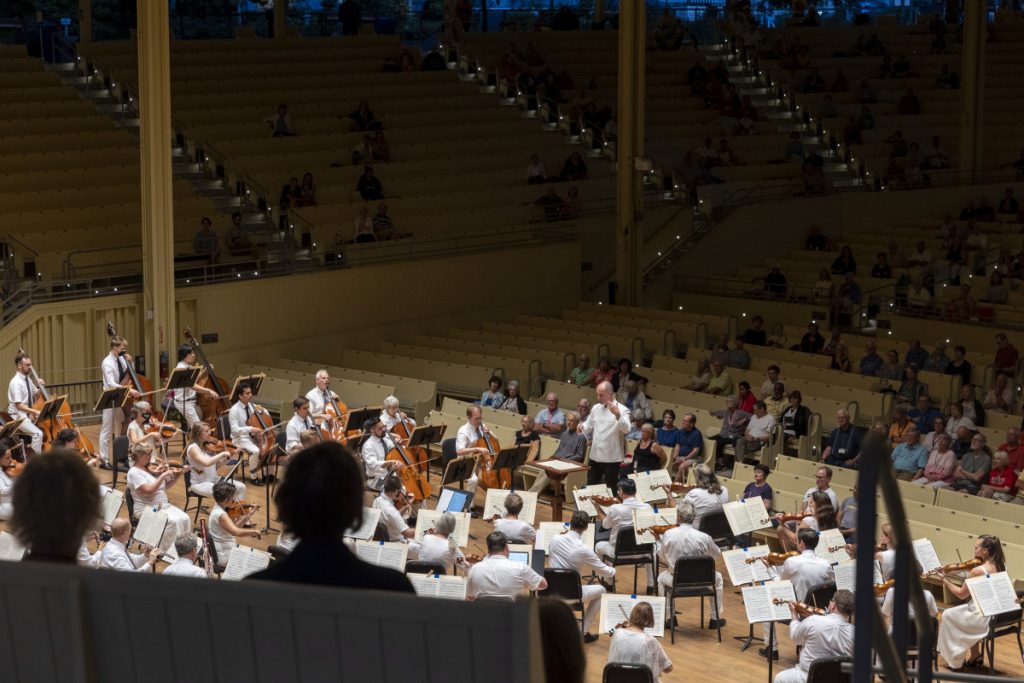NICHOLE JIANG – STAFF WRITER

Though this is the first time Montgomery’s work will be performed at Chautauqua; her compositions have been performed all around the world by the San Francisco Symphony, Philadelphia Orchestra and the New York Philharmonic. Montgomery is the recipient of the Leonard Bernstein Musicianship Award, and the New York Philharmonic selected Montgomery as one of the composers for their Project 19.
“I know a lot of orchestras have been playing Montgomery for the last few years, but I personally haven’t played it,” said Liana Kirvan, CSO violinist. “My husband’s a cellist and just performed the ‘Strum’ piece in a string quartet, and I got to hear it. I’m really looking forward to playing it. It’s got classical elements, modern elements, awesome rhythm and amazing melodies. It’s something I think the audience will really enjoy.”
Being able to feature Montgomery on Sunday’s program is special, Kirvan said, as female composers are at times overlooked.
“I’m very glad that more women composers are being performed,” Kirvan said. “(They) are not as often played, and I think that this should and will be changed in the near future with composers like Montgomery,” Kirvan said. “The work we’re hearing from women composers is fantastic. It’s a great thing that we’re featuring a modern female composer next to a Beethoven symphony.”
“Strum” is filled with different rhythms and melodies that seem to take on a life of their own. The piece features a pizzicato element that adds extra texture and serves as the underlying rhythm throughout.
“At one time, all the pieces we play were new,” Lieberman said. “Every piece that we came across was new at one point, and this happens to be a very nice piece.”
Beethoven’s First Symphony is part of the more classical repertoire that the audience is already familiar with. Many of the musicians have performed this particular symphony many times in the past. However, each performance, with a different conductor and a different setting, makes each time unique in its own way.
“It’s always a new thing to play a Beethoven symphony with a different conductor, because it’s all about their interpretation and their way of making us play a melody that we may have played a thousand times,” Kirvan said. “When you see somebody that has great knowledge about the composer’s life and they transfer how they want to the musician to play it, I feel like I’m playing a Beethoven symphony for the first time every time I play it. The Symphony No. 1 itself is also just a masterpiece.”
The four-movement symphony showcases Beethoven’s early musical experimentation, as well as the influences of Haydn and Mozart. It is a departure from traditional symphonic style, especially in the third movement. There’s also a heavy emphasis on the wind section.
“Beethoven was a key figure in bringing music into the Romantic era, mostly because he was not afraid to break the ‘rules.’ The standard symphony always established the key at the beginning,” Lieberman said. “This symphony is in the key of C, and it’s only in the 13th measure that this is established. It’s a very dramatic departure.”
This symphony allowed Beethoven to introduce himself and his work in a bold manner that left an everlasting impact. It’s been performed countless times all over the world, and the musicians discover something new with the piece each time.
“You can imagine any kind of play performed by different actors giving the same speech or monologue,” said Amanda Gates, first violinist. “The dialogue is the same, but what they bring to it is different. The inflection is slightly different, so as a listener, you’ll be able to hear a different take on what Beethoven had to say as a performer. With a different conductor, we get to hear a different interpretation. One of the best aspects of being an orchestral musician is revisiting these great works, which are just like the great novels of literature, but finding something new every time.”
Sunday’s concert is an opportunity for everyone to hear a more contemporary piece juxtaposed with a classical masterpiece.
“I think it’s very important that we reach the community and that we give concerts earlier in the day,” said Vahn Armstrong, violinist. “Not everyone is able to come to an 8:15 p.m. concert because it’s pretty late, so I think it’s a wonderful opportunity for those people to bring their families and be able to see us.”




